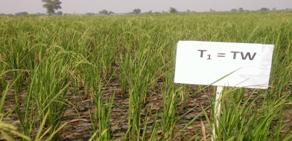 |
Tubewell Water (TW) alone |
|
Main thrust/theme:
Pakistan is facing an acute shortage of good quality water for irrigation. Ground water may supplement irrigation needs but its quality is mostly hazardous. About 55 MAF ground water is pumped, of which 70-75 % is brackish. Continuous use of such low quality ground water without appropriate management practices or amendments could make the soils saline/sodic. By now, about 3.5 mha soils have developed surface salinity/sodicity due to the use of poor quality irrigation waters. Recycling of low quality waters at or near source would permit an expansion of irrigated area and also will help to reduce drainage disposal or associated environment problems.
Farmers in arid and semi-arid regions are forced to exploit low quality ground water, which needs addition of a Ca-source. Otherwise such waters could result in deterioration of soil health and economic yield as well as produce quality. Considerable research work on the use of low quality water for irrigating crops has been carried out in Pakistan and abroad, but farm level adoption needs site-specific consideration because of differences in edaphic factors.
Since the gravity of salt problem soils and waters varies considerably, the technology transfer already established for such situations still needs continuous involvement of farmers to address the site-specific issues. It is, therefore, planned to demonstrate and replicate the known package of technology at the Proka Farm II to establish the Technology Park for productive use of poor quality soils and waters. This way, large abandoned areas will become productive and income of rural masses will increase to help alleviate the rural poverty. Keeping in view the worth of these studies, it is planned to extend these effects as an outreach program in the UAF focus area of Proka Farm II.
 |
TW + Canal Water (CW) |
|
Objectives
- To study and demonstrate the reclamation effectiveness of ground water with or without using inorganic amendments.
- Growth response of wheat-rice and berseem-sorghum crops to amelioration strategies on saline-sodic soils with the participation of farmers.
- To educate farmers about the reclamation technologies for salt-affected soils and low quality waters.
- To identify the constraints regarding the transfer of technology for amelioration of salt-affected soils using brackish water.
Achievements during the period under report
The soil reclamation with respect to pHs, ECe and SAR remained considerably better and faster/earlier with the cyclic irrigation of canal and tube well waters along with the application of farm manure @ 25 Mg ha-1, auger hole 60 m-2 along with gypsum @ 25% soil gypsum requirement (SGR) or gypsum alone @ 100% SGR. The same treatments produced the highest grain and straw yields of wheat and berseem crops. This suggests
that low quality waters could be used for irrigation on salt-affected soils by following the above treatments. No significant change in physical properties of soils was observed because improvement in these properties is a long term process.
|